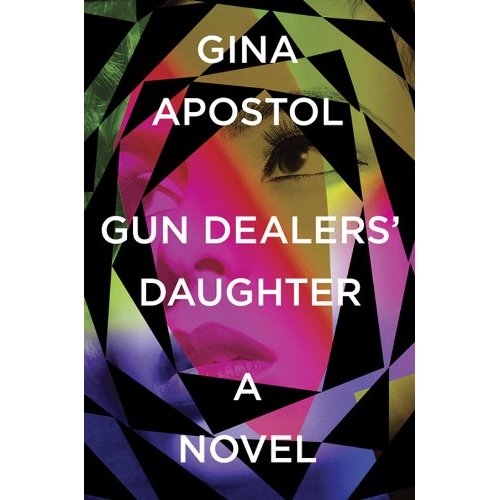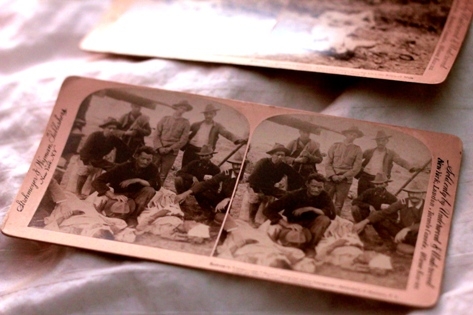Gina Apostol
On
August 14, 2013, Gina Apostol’s novel Gun
Dealer’s Daughter won the 2013 PEN/Open Book Award. Gun Dealers' Daughter tracks an upper-class teenager's lunge toward romantic rebellion during the 1970s Marcos Dictatorship. In the process, the novel reveals several stunning truths about the corrupt power structures in contemporary Philippines. “Not only does this novel make
an argument for social revolution, it makes an argument for the role of
literature in revolution -- the argument being that literature can be revolution.”
said PEN’s citation.
I
recently spoke with Apostol in Manhattan, New York.
How did the narrator of Gun Dealer's Daughter, Sol, first come to you?
The
novel was originally in third person, but it became mainly a satirical look at
the upper classes in the Philippines. I couldn’t figure out how to relate to Sol
-- her world is alien to me, and I disliked her. When I switched to first person,
I became implicated in Sol’s world: I was not just a satirist looking in. I was
complicit. That’s the feeling I wished for my reader.
In one scene you have, Sol
realizes she barely understands Tagalog and she’s in a dorm with no air
conditioning. It seems, even today, that the upper classes live in a completely
different Philippines, within the Philippines.
They
look Filipino, but they don’t live a Filipino life: most Filipinos are poor.
Wealthy Filipinos
don’t even feel the weather!
They
don’t feel anything. I don’t think there’s a lot of feeling among these people.
Because they can be so insulated. For
me, the wealth is not the truly problematic part; the details are certainly
absurd; but you know I understand the desire for material comfort. It’s the
blindness that is the problem -- that because of one’s comforts one is not able
to feel for others. It happens even to the middle class, of course: when we
cannot see the lives of our maids, or the drivers on the street. A Filipino American told me how when
he goes home to the Philippines, he becomes this different person who starts
ordering people around! He’s a scholar who analyzes the modern effects of
conquest, so he is horrified by himself, but he says it’s almost as if he can’t
help it.
Sol attempts, in her way, to act
beyond the incredibly insular behavior of her wealthy class status. To what
extent were your descriptions of the Philippine upper classes drawn from
memory, as opposed to invention?
It
would be a bit awkward to tell. But the mundane violences immanent in the lives
of the privileged in Manila are visible anyhow, wherever one goes. At
university, in social gatherings, at concerts, among friends. But to most of
the upper class, the idiocy of their lives is not so obvious to them. They are unconscious. Sol in the
novel had to grow up in that unconscious world. Her furniture, homes, books,
languages, hairstyles, shoes are all signs of crime. But her growing awareness
only gives her horror -- the way Gregor Samsa, the cockroach in Metamorphosis, finds only grief when he
discovers how his figure appalls others. It
is the fact that his figure appalls others that is important to Gregor Samsa,
who is a sensitive beast. The upper class in the Philippines
might as well be cockroaches, but I am not sure if they are sensitive,
or whether they are just beasts.
Whoa. When we travel to the
Philippines from America, we have the advantage of dollars. Are we beasts too?
It’s the
same thing in America. The issue of class and stratified worlds is not a
particularly Filipino problem. People like to talk about the corruption of the
Third World, whatever that is. I think it’s the same -- Manhattan, Manila.
There is a reason those are twinned in my novel.

Some argue that Filipinos blame
American colonialism and Spanish colonialism for a lot of their issues.
Our job
as citizens is about figuring out how to educate ourselves so that there’s a
healthy introspection. Yeah, the American regime and the Spanish regime left
their violence. But how to transcend? It is tiring to feel like a victim all
the time. How do we educate people so that we are truly able to reflect on ourselves
with honesty? We should include the horrors of the Americans and the Spaniards
in our sense of ourselves. But we should also recognize our complicity, and
also our agency. I am a weirdo, in that I believe still in the possibility of
change. It’s why I write.
How do you feel
about a Filipino writer’s chances in the U.S.?
Ahhh,
I don’t know. I have to not think about it, because you can get sucked into a
hellhole of irritability and depression. Anyway, I don’t think that’s my job.
My job is to write my books.
Junot Díaz was asked whether or not his use of
Spanish alienates people. He said, “Motherfuckers will read a book that is one
third Elvish, but put two sentences in Spanish and they think we’re taking
over.” I get that.
Really,
behind the question is an ideological unconscious -- Should people know about
Manila? Should people know about Philippine history? -- The question is a
statement that there are hierarchies about cultures that we should read or know
about. Junot is saying something similar, except he said motherfuckers.
In
sum, motherfuckers think Philippine history is not worth knowing. That’s why
they ask those questions. But even Filipinos ask that question, and that is
alarming.
So, why should motherfuckers in
America know about the Philippines?
Philippine
history is a part of American history and American history is a part of
Philippine history. I’m working on this massacre that happened during the
Philippine-American War in 1901, called Balangiga. Some of these photographs
that I’ve been looking at -- no one knows about these pictures of Filipino dead
taken by Americans for tourist souvenirs. Many of them are gruesome. It was
very much part of early twentieth-century American consciousness that has been
erased.

Example of Atrocity Photo
What is that
erasure?
For me,
it’s trauma. I believe American expansion in the Philippines in 1898 changed
America -- it changed America’s view of itself. And that rupture in identity is
a trauma that America is still working through.
I’m curious as to what you think about
humor as a particularly Filipino coping mechanism, for all of this historical
suffering.
All we
do is puns. Unlike Haiti, we haven’t killed our persecutors. We haven’t killed
the Marcos family yet. All we do is laugh about them, so they’re still alive. Like, literally. Even Imelda Marcos is in
power.
Instead
of killing, we do satire. Laughter is a form of killing that we do. It’s our
form of killing. But it’s not that efficient.
I do think
we keep things. There are ways that
we have kept a sense of ourselves despite the weirdness of also being
second-class or third-class or fourth-class -- which comes from looking at
ourselves through other people’s eyes: we’re very aware of the other. That is
our trump card -- it makes us very human, but it is not a conqueror’s way of
looking at the world.
Another
strength is our women. Filipino women are forces of nature. I read this Jesuit
chronicler in the 1600s -- he proselytized where I grew up, Leyte and Samar. The
funny comments Leyte women would make about Spaniards, laughing at them! “Why
would we go with your religion when we can marry as many men as we want? You’ll
only allow one in your lifetime! Whereas if we’re tired with one guy, we can go
with another!” I think there’s something in Filipina women -- at the same time
that they’re very oppressed by the Catholic laws of the country.
There is a statistic that the
Philippines is one of the most gender-equal societies in the world.
Yeah,
probably. People are scared of their moms anyway.
Ha! My mom is Filipina. I
recently became a dual U.S.-Philippines citizen. Do you have any advice for me?
Ay. Always use your U.S. passport
when you are leaving the Philippines -- otherwise, they make you pay an exit
fee. The government taxes you for being Filipino, but Americans escape free.
Story of the country.
Laurel Fantauzzo is an essayist and teacher living in Quezon City, Philippines. Her work has been published in Grantland, Lapham's Quarterly Online, The Manila Review, and GMA News, among other places. She currently teaches in the English and Fine Arts departments at Ateneo de Manila University.









Comments